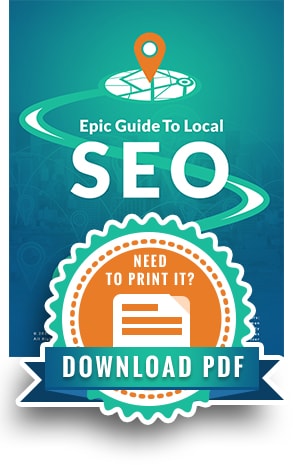Now that we’ve discussed why local SEO is so important for businesses, let’s take a look at how a business can improve its local ranking. Local SEO is impacted by a variety of factors related to online presence. In order to get the most out of local SEO, it’s best to optimize for all of them.
Primary Factors that Influence Local SEO Ranking
 Google My Business
Google My Business
Claiming and updating a company’s GMB listing is a crucial step toward maintaining a consistent, polished web presence and boosting local SEO ranking. We’ll talk in more detail about Google My Business in the next section.
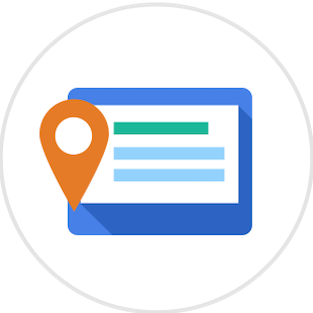 Citations
Citations
Any online mention of a local business is called a citation. Citations can include a link to the website but don’t always. Common citation sources include local directories such as Yellow Pages, Yelp! and Judy’s Book.
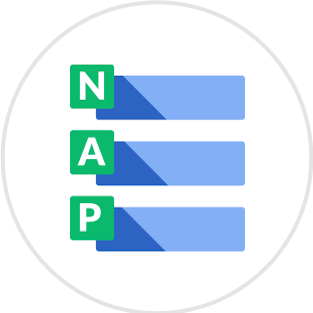 NAP
NAP
Stands for name, address and phone number. Both the quality and quantity of directory listings affect local SEO, but NAP consistency is the most important characteristic.
 Reviews
Reviews
The diversity and veracity of customer reviews and ratings provides search engines and consumers with candid feedback about the business.
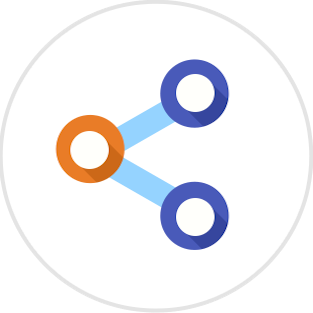 Social Signals
Social Signals
Social media platforms like Facebook, Twitter and LinkedIn allow companies to develop more personal relationships with customers and cultivate social proof that can influence search engine results.
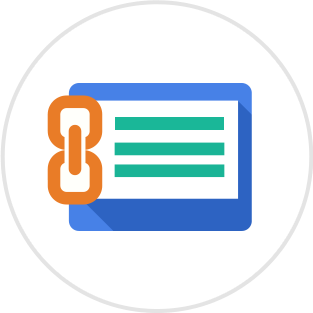 Links
Links
Search engines look at the authority and relevance of the websites that link to a company’s website. When it comes to backlinks quality trumps quantity, because any connection to untrustworthy websites will raise red flags for search engines.
The Cycle of Clicks and Local SEO Ranking
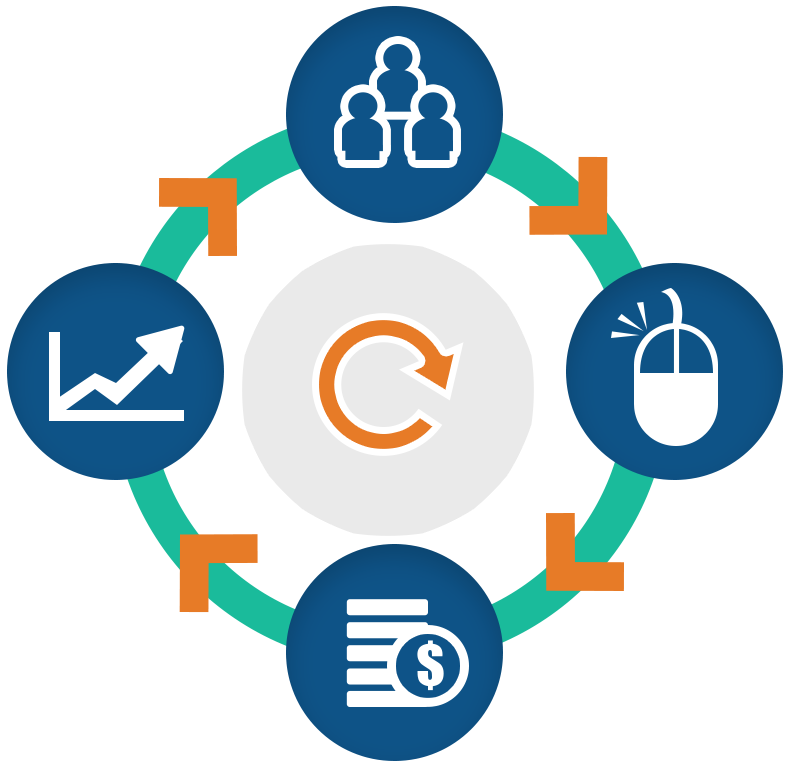 The more clicks a website receives, the better.
The more clicks a website receives, the better.
There are two reasons for this. The first is obvious – more clicks means more website visitors, higher engagement, more conversions and more new customers. The second reason is that receiving clicks positively affects a company’s local SEO. The more customers that visit and spend time exploring a website, the better that site will rank on Google, because the search engine recognizes that those visitors found value in the site’s content. Basically, more clicks leads to better SEO ranking, which leads to more visibility, which leads to more clicks.
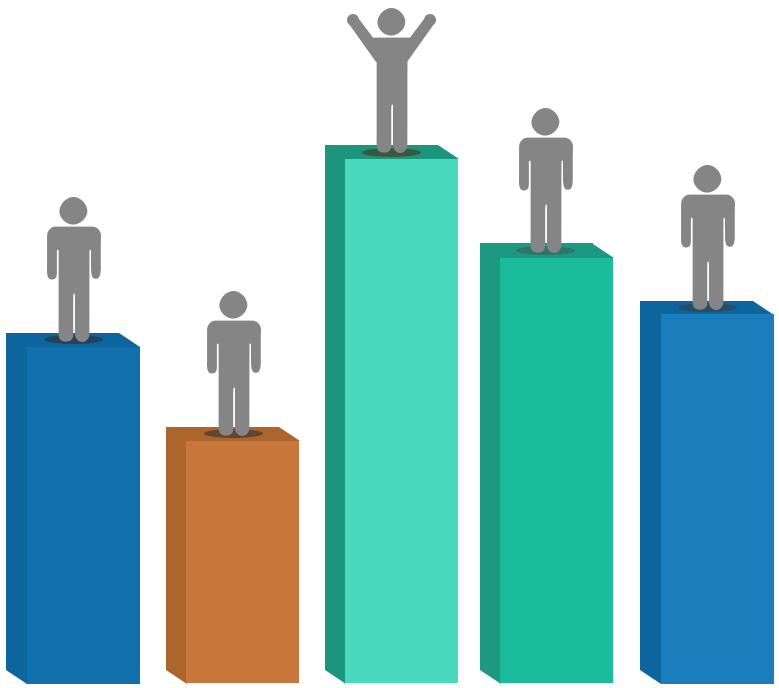 How Competition Affects Local SEO Ranking
How Competition Affects Local SEO Ranking
It’s considerably easier for a company with less local competition to improve its ranking than it is for a business with lots of local competitors. In order to evaluate a company’s local ranking, take a look at the local competition. Niche practitioners will find it easier to reach the top of local SERPs than more mainstream businesses. Regardless of how fierce the competition is, maintaining an updated web presence and staying on top of major algorithm updates is crucial.
 Google’s Local SEO Algorithm Updates
Google’s Local SEO Algorithm Updates
Google is a perfectionist. The algorithms used by the search engine giant are constantly evolving and improving. Sometimes the updates are so minor and gradual that no one notices, and sometimes the updates are sudden and significant enough to send the SEO community into a frenzy.
Google is constantly improving its methods to serve up the best, most relevant local results to searchers. Regular algorithm updates make it easier for Google to identify and penalize scammers, which is great for consumers. However, the frequent updates can also present challenges for legitimate businesses attempting to stay up-to-date on local SEO best practices.
Some of Google’s updates that seriously influenced local SEO include:
- Pigeon
- Local 3-Pack
- RankBrain
- Penguin Real-Time
 Google Pigeon Update
Google Pigeon Update
In July 2014 Google rolled out the Pigeon algorithm update to improve the quality of local search results. Pigeon gives preference to local businesses by customizing search results to the user’s specific location. The algorithm calculates a customer’s proximity to nearby businesses that match their search query to serve up the most targeted results possible. Pigeon is designed to benefit users – especially those performing searches on mobile devices – and local businesses that properly optimize for local SEO.
 Google My Business
Google My Business
No business can land a spot in the local pack without a verified Google My Business listing, so it’s necessary to create or claim the business’ listing ASAP.
 Local Address
Local Address
Businesses located in the city they serve are given priority, so setting up shop in the same place the business targets customers is ideal. However, to better serve mobile users who Google on-the-go, 3-pack results also change based on the searcher’s exact location.
 Citations
Citations
Online business listings are vital to local search results. Certain directories are more influential and relevant in specific cities or states, so each business should tailor its strategy to ensure an up-to-date presence on the most authoritative local directories.
 Behavioral Signals
Behavioral Signals
Increasing interaction with the business listing – either by improving the website’s click-through rate or click-to-calls on mobile – signals to Google that the business is relevant to local consumers.
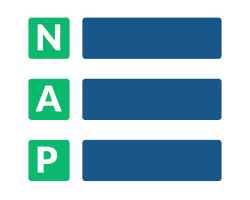 NAP Consistency
NAP Consistency
The name, address and contact information on every page of a business’ website should exactly match the details on its Google My Business listing and other listings.
 Personalization
Personalization
Companies with strong branding, a user-friendly web design and unique content are more likely to be rewarded with a spot in the local pack.
RankBrain and the Role of Artificial Intelligence in Local SEO
 In 2015, Google integrated artificial intelligence (AI) into its search engine. RankBrain allows AI technology to complement Google’s intricate algorithms to return even more accurate search results based on the user’s intent. RankBrain makes it possible for Google to consider the thought process behind a consumer’s search terms rather than just the surface-level meaning of the words entered into the search bar. RankBrain analyzes the meaning behind keywords and weighs information learned from previous search activity to display the most targeted results possible.
In 2015, Google integrated artificial intelligence (AI) into its search engine. RankBrain allows AI technology to complement Google’s intricate algorithms to return even more accurate search results based on the user’s intent. RankBrain makes it possible for Google to consider the thought process behind a consumer’s search terms rather than just the surface-level meaning of the words entered into the search bar. RankBrain analyzes the meaning behind keywords and weighs information learned from previous search activity to display the most targeted results possible.
Businesses with a strong content marketing plan in place are likely already creating content that RankBrain will find valuable. However, websites that practice keyword stuffing or intentionally publish content that appeals to search engine crawlers but not to real people will not impress Google’s AI. Rather than trying to predict how RankBrain will perceive the content, local businesses should focus on providing value to their customers. After all, any updates to RankBrain will only make it more intelligent, more human-like and more capable of differentiating between low-quality spam and high-quality content.
Tips for Content RankBrain Will Love
 Think like a consumer. Get inside the target audience’s head, find out what they are searching for and tailor the website’s content accordingly.
Think like a consumer. Get inside the target audience’s head, find out what they are searching for and tailor the website’s content accordingly.
 Focus on solving problems and answering questions. Frame content in terms of how it benefits the reader rather than just boasting about the business.
Focus on solving problems and answering questions. Frame content in terms of how it benefits the reader rather than just boasting about the business.
 Talk to real people. Ask existing customers what common questions and concerns they have about the business or industry. Internal sources, like sales staff or account managers, can also provide insight into consumer behaviors.
Talk to real people. Ask existing customers what common questions and concerns they have about the business or industry. Internal sources, like sales staff or account managers, can also provide insight into consumer behaviors.
 Learn from social media. Take notice of what type of posts receive the most engagement and build a content strategy around that.
Learn from social media. Take notice of what type of posts receive the most engagement and build a content strategy around that.
As Google continues to release algorithm updates and introduce new approaches, brands, agencies and SMBs should strive to broaden their understanding of local search and use that knowledge to develop an effective local strategy.
You Are What You E-A-T
Good content can be measured according to E-A-T, or expertise, authoritativeness and trustworthiness. E-A-T is one factor that determines page quality, along with others such as main content, information accuracy and website reputation. The higher the page quality, the more likely a site/page will place higher in consumer search.

Main content now comes in many formats from traditional copy to videos, shopping carts and online games. To lead to higher rankings, each of these components must demonstrate expertise, authoritativeness and trustworthiness.
Whether a site is about gossip, games, or classified as YMYL (Your Money Your Life), all must possess “everyday expertise” according to Google. In this case, experts (or those who possess authoritativeness and trustworthiness) are people who have invested time and care into developing themselves or their craft.
 Good, solid content has long played a role in establishing a website’s authority, and Google’s Search Quality Evaluator Guidelines reveal just how true this is.
Good, solid content has long played a role in establishing a website’s authority, and Google’s Search Quality Evaluator Guidelines reveal just how true this is.
Google Penguin Real-Time Update

Google has folded Penguin into the Google core algorithm and it now updates in real-time!
Cleaning up a site and removing spam links makes Google happy, and it rewards SEOs by showing the change in rankings within a relatively short period of time. That long wait to recover from being penalized is over. And of course, real-time means that Google will no longer make announcements about Penguin refreshes.
This latest update is a win—there is no downside to SEOs unless someone is still practicing black hat link building. Those who are actively working to clean up their link profiles will be rewarded so much faster.
If you have questions about good links versus web spam links, consult an SEO company that knows the difference!





